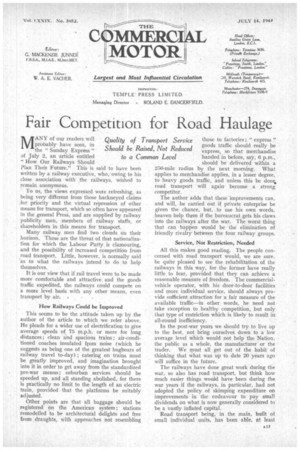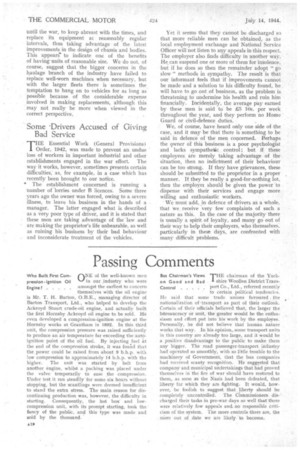Fair Competition for Road Haulage
Page 19

Page 20

If you've noticed an error in this article please click here to report it so we can fix it.
MANY of our readers will probably have seen, in the "Sunday xpress " of July 2, an article entitled "How Our Railways Should Plan Their Future." This is said to have been written by a railway executive, who, owing to his close association with the railways, wished to remain anonymous.
To us, the views expressed were refreshing, as being very different from those hackneyed claims for priority and the virtual repression of other means for transport, which so often have appeared in the general Press, and are supplied by railway publicity men, members of railway staffs, or shareholders in this means for transport.
Many railway men find two clouds on their horizon. These are the threat of that nationaliza tion for which the Labour Party is clamouring, and the possibility of increased competition from road transport. Little, however, is normally said as to what the railways intend to do to help themselves.
It is our view that if rail travel were to be made more comfortable and attractive and the goods traffic expedited, the railways could compete on a more level basis with any other means, even transport by air, How Railways Could be_Itnproved This seems to be the attitude taken up by the author of the article to which we refer above. He pleads for a wider use of electrification to give average speeds of 75 m.p.h. or more for long distances; clean and spacious trains ; air-conditioned coaches insulated from noise (which he suggests as being one of the greatest bugbears of railway travel to-day) ; catering on trains must be greatly improved, and imagination brought into it in order to get away from the standardized pre-war menus; suburban services should be speeded up, and all standing abolished, for there is practically no limit to the length of an electric train, provided • that the platforms be suitably adjusted.
Other points are that all baggage should be registered on the American system ; stations remodelled to be architectural delights and free from draughts, with approaches not resembling those to factories ; " express " goods traffic should really be express, so that merchandise handed in before, say, 6 p.m., should be delivered within a 250-mile radius by the next morning. What applies to merchandise applies, in a lesser degree, to heavy goods traffic, and unless this be don% road transport will again become a strong competitor.
The author adds that these improvements can, and will, be carried out if private enterprise be given the chance, but, to use his own words, heaven help them if the bureaucrat gets his claws into the railways after the war. The worst thing that can happen would be the elimination of friendly rivalry between the four railway groups.
Service, Not Restriction, Needed All this makes good reading. The people concerned with road transport would, we are sure, be quite pleased to see the rehabilitation of the railways in this way, for the former have really little to fear, provided that they can achieve a reasonable measure of freedom. The commercialvehicle operator, with his door-to-door facilities and more individual service, should always provide sufficient attraction for a fair measure of the available traffic—in other words, he need not take exception to healthy competition, but only that type of restriction which is likely to result in all-round inefficiency.
In the post-war years we should try to live up to the best, not bring ourselves down to a low average level which would not help the Nation, the public as a whole, the manufacturer or the trader. We rpust all get out of the habit of thinking that what was up to date 20 years ago will suffice in the future.
The railways have done great work during the war, so also has road transport, but think how much easier things would have been during the war years if the railways, in particular, had not adopted the policy of skimping expenditure on improvements in the endeavour to pay small dividends on what is now generally considered to be a vastly inflated capital.
Road transport being, in the main, built of small individual units, has been able, at least until the war, to keep abreast with the times, and replace its equipment at reasonably regular intervals, thus taking advantage of the latest improvements in the design of chassis and bodies. This appears"' to indicate one of the benefits of having-units of reasonable size. We do not, of course, suggest that the bigger concerns in the haulage branch of the industry have failed to replace well-worn machines when necessary, but with the larger fleets there is sometimes the temptation to hang on to vehicles for as long as possible because of the corisiderable expense involved in making replacements, although this may not really be more when viewed in the correct perspective. • Some -Drivers Accused of Giving Bad Service THE Essential Work (General Provisions) Order, 1942, was made to prevent an undue loss of workers in important industrial and other establishments engaged in the war effort. The way it works, however, sometimes presents certain difficulties, as, for example, in a case which has recently been brought to our notice.
• The establishment concerned is running a number of lorries under B licences. Some three years ago the owner was forced, owing to a severe illness, to leave his business in the hands of a manager. The latter engaged what is described as a very poor type of driver, and it is stated that these men are taking advantage of thern law and are making the proprietor's life unbearable, as well as ruining his business by their bad behaviour and inconsiderate treatment of the vehicles. Yet it seems that they cannot be discharged so that more reliable men can be obtained, as the local employment exchange and National Service Officer will not listen to any appeals in this respect. The employer also finds difficulty in another way. He.can suspend one or more of them for insolence, but if he does so then the remainder adopt " go slow" methods in sympathy. The result is that our informant feels that if improvements cannot be made and a solution to his difficulty found, he will have to go out of business, as the problem is threatening to undermine his health and ruin him financially. Incidentally, the average pay earned by these men is said to be £5 10s. per week throughout the year, and they perform no Home Guard or civil-defence duties.
• We, of course, have heard only one side of the case, and it may be that there is something to be said in defence of the men concerned. Perhaps the owner of this business is a poor psychologist and lacks sympathetic control; but if these employees. are merely taking advantage of the situation, then no indictment of their behaviour can be too strong. If they have grievances, these should be submitted to the proprietor in a proper manner. If they be really a good-for-nothing lot, then the employer should be given the power to dispense with their services and engage more willing and enthusiastic workers.
We must add, in defence of drivers as a whole, that we receive very few complaints of such a nature as this. In the case of the majority there is usually a spirit of loyalty, and many go out of their way to help their employers, who themselves, particularly in these days, are confronted with many difficult problems.




















































